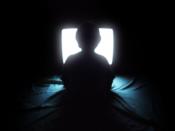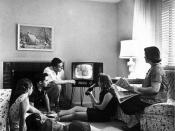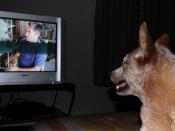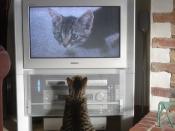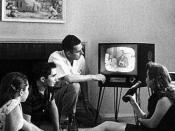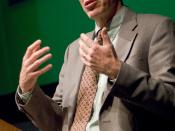Kathy Banks Professor Kalloniatis ENGL 1101, Section BBB 12 October 2002 The Control of Television What is the first thing we normally do when we walk in the door? Set our keys down, kick off our shoes, and turn on the television. It seems that today?s society has become more and more dependant upon the magical little box that sits in our living rooms, as well as many other rooms in the house. It is startling to realize how much of our lives begin to center on television. Now with the convience of TV dinners, families no longer sit at the table to eat. Instead, they sit in front of the television anxiously awaiting their favorite programs to come on. Friends put off other friends, saying they have to be home in time to watch a certain show at a certain time. This happened to me just the other day, when I rode with a girl in my dorm to our kickboxing class.
As we were walking out to her car after class, she looked down at her watch and suddenly said that we had to hurry. She did not want to miss the beginning of Survivor. I, on the other hand, was starving, and was hoping to get something to eat on the way home, but I soon learned that this was going to be impossible. We did not have enough time, and my hunger would have to be sacrificed in order for her to able to get home in time to watch her show. Bill McKibben?s article entitled ?Television and the Twilight of the Senses? discusses the idea that television may have too much of a strong hold in our lives. Through various examples, he is able to demonstrate that we might want to take a long hard look at how much television is ruling our lives.
To some, however, television serves as a life- line to the rest of the world. Through TV, people are able to get the information they need to plan their day, change their stocks, and connect to the happenings in other parts of the country. Another positive example of TV usage, is the fact that it does bring people together, and allow families to spend time with one another. It also offers a form of entertainment that is enjoyable, as well as, relaxing. Many men and women have spent many Sunday afternoons lounging out, eating pretzels, and watching football. TV provides an outlet for us to just sit and not have to use our brains; however, television has become too much of a focal point in people?s lives because they lose their perspective on the world, it delays their lives, and distorts their senses.
I can recall one evening while I watching TV a commercial that came on for Sears. After the wife in the commercial told her husband that the new television he brought home was not big enough, they started a search for a bigger one. They kept going bigger and bigger until they finally found a television that would take up all the extra space in their entertainment center. After reading McKibben?s article I looked back on this commercial and thought that no matter what this couple did they would never be able to completely see the entire picture. McKibben says, ?TV chops away perspective, too. On the mountain, even if your eye is drawn to something in particular, your peripheral vision fills in all sorts of detail, constantly. When you watch TV your peripheral vision ceases to function-you stare at the screen like a pitcher staring in at the catcher?s mitt? (page 111). It is now clear that the couple above really will never see the complete picture. They will always be missing something. So many times we zone out while watching TV that we miss the things that are going on around the outside of the little black box.
Our perspective is cut down even farther because no matter where we are in the room the picture still looks the same. When watching a play you might see something totally different than the person who is sitting three rows to your left. Expressions, lighting, or scenery can look completely different when sitting somewhere else. However, TV takes away this option by only giving you one view of the program that you are watching. ?Or consider the difference between watching a baseball game on TV and watching one at the park. Technology enriches the TV version with close-up and slow-mo and instant replay, but at a great price. It deprives you of the enormous perspective available to anyone in the stadium, the incredible choice of what to look at? (McKibben 112).
McKibben brings to light that television does give us many extra luxuries, but we still lose that all-important perspective. We are unable to look over at the bull- pen to see who will be warming up to pitch until the camera decides to show it to us. We cannot see the flashing lights of the advertisements, or look up to the crisp blue sky. By relying so heavily on television to see the world we often lose a lot of the extra things that make real life so much better. ?At the beginning of And So It Goes, Linda Ellerbee?s book about her TV career, she recalls a conversation with colleagues about whether her new show should be live or on tape. Her son Josh overhead the argument and interrupted: ?This is live,? he said. ?You, me, everybody in this room. This is live. That, Mom,? he said pointing to the box, ?that?s television?? (McKibben 112). Therefore, TV actually gets in the way of seeing life the way it was intended to be seen-in real life.
Often at times we need an escape from our lives. A car, school, working, and maintaining good relations with our families can really put a burden on us. It is easy to get lost in the world of television, and put our lives and problems on hold for half an hour. Television can be counted on to produce the same emotions every time you watch a certain show. The show Friends is going to make you laugh, ER and Law and Order will normally make you cry, but it may even make you angry at some point. Every producer goes out with the intention of making a show that will provide arousal of a different emotion. We enjoy this. We enjoy getting a break from our everyday lives, and being in someone else?s world. However, too often do we take this pleasure for granted and misuse the privilege of watching television. ?We use TV as we use tranquilizers-to even things out, to blot out unpleasantness, to dilute confusion, distress, unhappiness, loneliness? (McKibben 115). Life has its ups and downs. We cannot expect to go through life with the impression that nothing bad will ever happen to us- it is simply impossible. By us using TV as a tranquilizer to numb ourselves we sometimes miss the low points in our lives, but we also miss the lessons that can be learned from those misfortunes. ?Instead of really experiencing the highs and lows, pain and joys, that make up a life, many of us use TV just as we use central heating-to flatten our variations, to maintain a constant ?optimal temperature?? (McKibben 114).
How can we expect to live a full life if we do not actually live our own lives? If we never move away from our TV?s, and away from the perfect settings of the Cosby family, we will never be able to get anything done. I will admit that I have gotten caught up in a television shows characters and plots. It was even brought up in Mckibben?s article. I was one of those unhappy people after they killed Lt. Col. Henry Blake on M*A*S*H. I can remember crying with my mother, and telling her they just could not do that. I felt like I had lost one of my family members, but life moves on, and I eventually got over the death of my ?family.? It is amazing how easy it is to forget about our own lives and move into someone else?s. Losing touch with reality is just another side effect of watching too much TV.
?If you cut off your nose to spite your face, or for any other reason, it wouldn?t impair your ability to watch television? (McKibben 111). McKibben?s statement could not be any closer to the truth. What senses, other than seeing and hearing, do we use to watch TV? The answer is none. Television limits the use of our senses so much that we might want to consider our sense of smell, touch, and taste to be a dying art. At the end of the text there are some questions about McKibben?s piece, and one asks why other forms of mass communication, such as writing and theater, do not distort our senses like TV. Well the answer is really quite simple. Writing and theater allow you to use your brain and imagination. They make you think about what the actor is doing, and feel his pain during a sword fight, or taste the mouth watering fried chicken you are watching him eat.
Reading and writing have similar effects. While reading a novel I can smell every pine tree in a forest, and feel the coolness of a breeze that blows through my hair. Television takes out this use of imagination. They have already done the work. There is no need for us to try and think of anything because it is all cut and dry right there in front of us. In the begin of McKibben?s piece he has a short story about going swimming in a lake in the mountains. With every line there is an outpouring of senses, and thoughts.
You cannot get away from it, and it is so refreshing. Reading, writing, and theater are all ways in which you can engage your brain and use all of your senses that have been lost while watching television.
It seems so easy, just turn a knob or press a button and our lives are completely changed. We have come to rely heavily on the luxuries that television brings us. The constant and steady stream of emotions that will balance our chaotic lives, but at what price do we pay for these emotions. Through watching TV we often lose a lot of the perspective we have in the outside world. We also miss out on many of the things going on in that outside world. If we do not experience everything this world has to offer how will we ever make it a better place? Also, we let our senses and imagination get out of shape. By just sitting and watching television all day we lose our ability to think of things on our own. All we know how to do is take in the information that the television is sending out. Therefore today?s society often suffers the consequences of allowing television to become too much of a revolving point in their lives through their loss of perspective, delaying their own life, and a loss of imagination.
